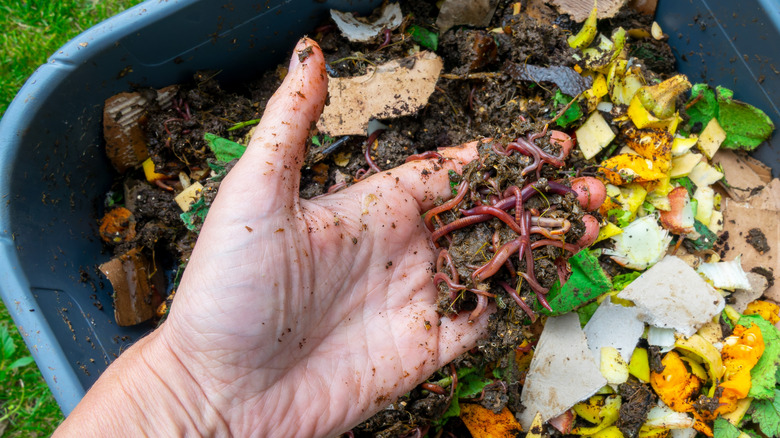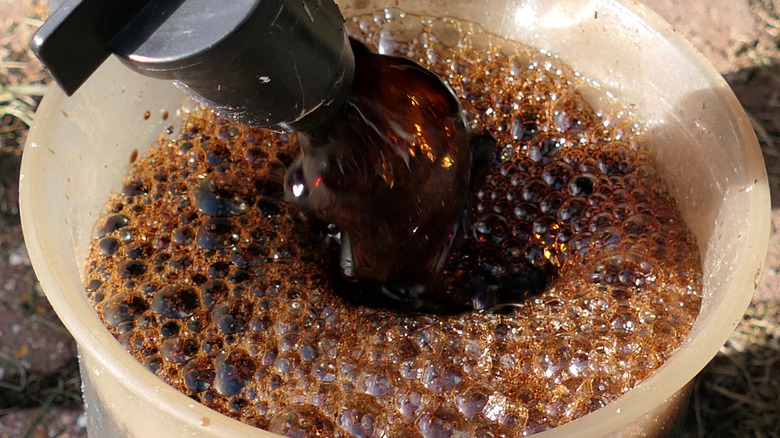How To Use Worm Castings To Help Your Garden Thrive
We may receive a commission on purchases made from links.
It may be hard to wrap your head around the garden value of worm castings — the waste produced by lowly earthworms. They're collected from worm composting (vermiculture) systems, which function much like compost piles. Some gardeners have a simple worm farm at home, though you can also buy ready-to-use castings. This worm-made product has valuable uses in the garden. You can incorporate castings directly into potting mix, topsoil, and flower and vegetable beds for a healthy boost of nutrients. Arguably, however, worm castings are at their most powerful when turned into a DIY fertilizer tea you can make to nourish your garden. It's water soluble and delivers nutrients to plants immediately.
Why are castings such a great addition to your garden? For one, they're full of beneficial microbes that help plants resist pests and soil-borne diseases. They also contain essential plant nutrients like nitrogen, phosphorus, and potassium, along with micronutrients, including iron, sulfur, copper, calcium, magnesium, and zinc. They're more nutrient-rich than compost. As if all this weren't impressive enough, the castings get coated as they travel through a worm's digestive system, turning them into a sort of natural slow-release fertilizer. Applying worm castings, sometimes called vermicompost, to your garden soil can improve fruit and vegetable yields, taste, and appearance, as well as size, color, quantity, and quality of flowers.
How to turn worm castings into a fertilizer tea
Worm fertilizer tea isn't simply the liquid that leaks out of the bottom of a worm farm — this worm leachate is useable when heavily diluted, but it typically smells nasty. True tea made from worm castings is brewed, just as you would a cup of English breakfast. It has no bad odor and teems with microbiological activity. If you want to harvest your own castings, you'll need to start worm composting in your kitchen or backyard. Once the farm is set up, the worms will take about two to four months to produce lots of castings, though you could have enough to make tea as early as three weeks.
For a much quicker and arguably cheaper start, you can buy worm castings. A 1-quart bag of Plantonix Worm Bliss Organic Worm Castings costs about $14. Whichever route you decide to take, the tea-making process is the same. To make worm tea, you need a ratio of 16 parts water to one part castings, or 1 gallon of water to 1 cup of castings. Fill a bucket with the water and place the castings into a fine-weave cloth bag. Immerse them completely in the water. Stir the water and then leave everything to soak for at least 24 hours. If you're handy, you could install an aquarium pump to aerate the water.
Apply worm tea to your garden or just use the raw castings
Once your worm tea is ready, you need to use it quickly for the most benefit. It has a very short shelf life: the beneficial microbes won't stay alive forever. Use it within 48 hours from brewing it. Decant the tea into a watering can for easy application and apply it to your garden once per month before watering. It also works well as a foliar spray for fertilization or to suppress various plant diseases. Just as regular compost tea might be the secret to a lush, pest-free garden, worm compost tea may be the secret to getting the most out of your plants.
If that all sounds too difficult, you can buy ready-made worm tea — for example, a 1-quart bottle of VermisTerra Organic Earthworm Soil Enhancer costs about $24. Whichever brand of worm tea you buy, dilute it according to the manufacturer's instructions before using it on your garden. Prefer a slower approach? Worm castings (the raw product you make the tea from) are best used for long-term soil building. You can mix them into compost at a ratio of 1:3 or potting soil at a ratio of 1:4. You can also top-dress planters and beds, working it into the soil with a trowel or fork, or add a handful of castings to the bottom of planting holes. Use them sparingly on cacti and succulents.


